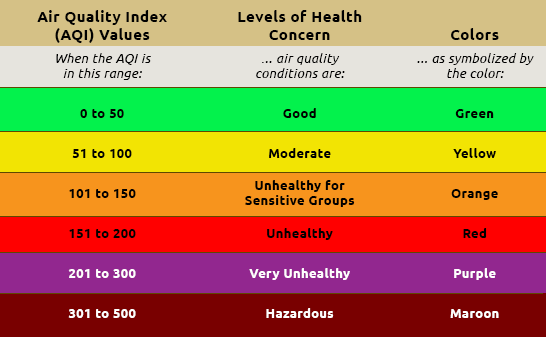Wildfire Smoke & Air Quality Alerts
RVEM
Smoke levels can quickly rise and fall depending on weather factors, such as wind direction and how much smoke the wildfire produces. Therefore, people must be observant of the air quality during wildfire season.
Wildfire smoke is a complex mixture of air pollutants harmful to human health. Exposure to air pollutants in wildfire smoke can irritate the lungs, cause inflammation, alter immune function, exacerbate chronic heart and lung disease, and increase susceptibility to respiratory infections.
The particulate matter (also called “PM”) in wildfire smoke poses the biggest risk to the public’s health. Particles larger than 10 micrometers usually irritate only the eyes, nose, and throat. Fine particles 2.5 micrometers or smaller (PM2.5) can be inhaled into the deepest part of the lungs and even enter the bloodstream.
PM 2.5 levels have reached hazardous in Jackson County over the last 24 hours.
Populations known to be vulnerable to wildfire smoke exposures include:
- Children less than 18 years;
- Adults age 65 years or older;
- Pregnant women;
- People with chronic health conditions such as heart or lung disease, including asthma and diabetes;
- Outdoor workers;
- People of low socioeconomic status, including those who are experience homelessness and with limited access to medical care.
During a wildfire smoke event, Jackson County Public Health Officials advise people to take the following precautions:
- Be aware of smoke concentrations in your area and avoid the places with the highest concentrations.
- Avoid strenuous outdoor activity in smoky conditions.
- Stay indoors with doors and windows closed. This reduces exposure to particulate matter in the air.
- Use air conditioning to keep your home cool if it becomes too warm.
- Other sources of particles within the home should be reduced or eliminated: smoking, using gas, wood‐burning stoves or furnaces, aerosol sprays, frying or broiling meat, burning candles or incense, and vacuuming.
- High-efficiency particulate air (HEPA) filters and Electro-static precipitator (ESP) filters can help provide protection. The HEPA filters trap or remove harmful particles in the air.
- If a HEPA or ESP filtering options are unavailable, you might consider a DIY option by attaching a furnace filter on a box fan. People may qualify for a free air conditioner or air filter through the Oregon Health Authority’s Air Condition and Air Filter Deployment Program.
- Create a clean room(s) in the home to keep levels of smoke and other particles as low as possible during a wildfire smoke event.
- When riding in a car, keep the windows and vents closed; turn the air conditioning on to recirculate.
- Drink lots of water - staying hydrated can keep your airways moist, which will help reduce symptoms of respiratory irritation such as scratchy throat, running nose, and coughing.
- People exposed to smoky conditions and who suffer from asthma or other respiratory problems should follow their breathing management plans or contact their healthcare providers.
If you must be outdoors when air quality is poor, wearing a special mask called a “particulate respirator” can also help protect your lungs from wildfire smoke. You will want to choose a mask called a “particulate respirator” that has the word “NIOSH” and either “N95” or “P100” printed on it. Masks that are not NIOSH-certified may not offer protection from small particulate matter, even if properly worn.
Many people will find it challenging to use particulate respirators. It is important to make sure the respirator fits properly, and that air does not leak around the sides. It is impossible to get a good seal on individuals with facial hair. If it does not fit properly, the respirator will not provide good protection and may offer the wearer a false sense of protection. Review the United States Environmental Protection Agency’s directions on how to properly wear a particulate respirator.
Particulate respirators can make breathing more difficult and increase breathing and heart rate. They can also contribute to heat stress. Because of this, particulate respirators used by those with heart and respiratory diseases should be done under a doctor’s supervision. Even healthy adults may find that the increased effort required for breathing makes it uncomfortable to wear a respirator for more than short periods. Check DEQ’s Air Quality Index (AQI) to see real-time air monitoring data from monitors placed around Oregon https://oraqi.deq.state.or.us/home/map. DEQ also has a mobile app for the AQI, search for OregonAir in your app store. Keep in mind that monitoring locations are limited, pollution levels may be higher in some areas, and wildfire smoke levels can rise and fall rapidly. Use the Oregon Smoke Information Blog, oregonsmoke.org, for updated air quality advisories, wildfire smoke forecasts, and other information.
Here are the six levels of the air quality index and what each level means for your health:

Resources: